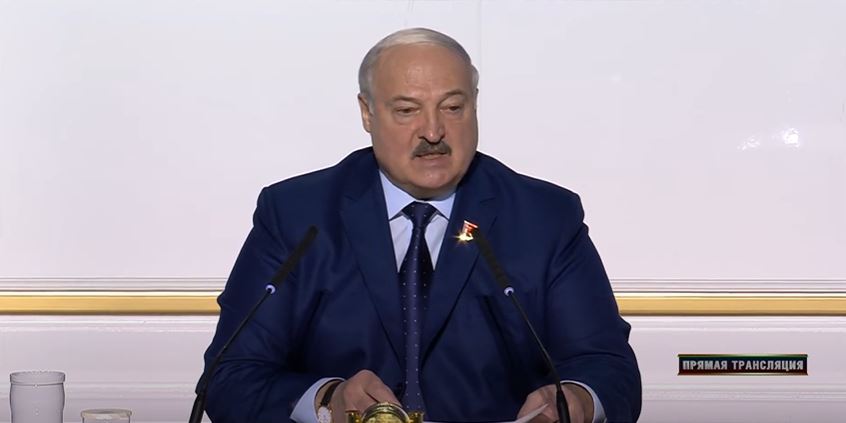On 25 April, the second day of the meeting of the 7th All Belarusian People's Assembly, a regular propaganda event convened to demonstrate unanimous support for Belarusian ruler Aliaksandr Lukashenka, the self-proclaimed president and his entourage made a series of anti-Western and anti-Ukrainian statements to show that Belarus is under a threat, which followed by the assembly unanimous approval Lukashenka's new National Security Concept and Military Doctrine of the Republic of Belarus.
Among the relentless stream of propaganda narratives, two particularly absurd stories stood out: the Belarusian KGB chief's claim about preventing a nonexistent drone attack from Lithuania on Minsk, and Lukashenka's statement that Belarusian opposition plans to capture a particular district in the country and deploy NATO troops there.
Lukashenka also described the Russian nuclear weapons stationed in Belarus as a deterrent against neighboring countries, hinting at their potential use if Belarus is invaded.
Belarus claims to have prevented drone attack from Lithuania, the latter calls the claim nonsense
Belarusian State Security Committee (KGB) Chairman Ivan Tertel claimed that Lithuania, Poland, and Ukraine ostensibly train Belarusian radicalists to carry out terrorist attacks in Belarusian territory.
Those "radicalists" are allegedly producing combat drones in Lithuania and Poland to attack critical facilities in Belarus, Tertel stated, further even claiming the following without any evidence:
"The State Security Committee, in cooperation with colleagues from other security agencies, has recently carried out a number of acute Chekist (from CheKa, the initial acronym for the Soviet KGB, - Ed.) measures, which allowed to prevent strikes by military drones from the territory of Lithuania against objects in Minsk and its suburbs. We continue to work in this area, but it is not yet possible to provide detailed information to the public," the Belarusian KGB chief said.
Major Gintautas Ciunis, a spokesman for the Strategic Communications Department of the Lithuanian Armed Forces, denied the Belarusian allegations of a drone attack on Minsk:
“I can give 100 percent that this is disinformation. It’s nonsense that Lithuania would carry out a drone strike on Belarus, I cannot find any other word for it,” he told LRT, saying such statements are laughable.
Vilmantas Vitkauskas, head of the Lithuanian National Crisis Management Center, noted that such narratives from Belarus have circulated before, especially during NATO exercises in the Baltic states, and Lukashenka was saying similar things in early March. He described these statements as a continuous hostile provocation and information attack against Lithuania, aimed at the Belarusian domestic audience, as per LRT.
Belarus dictator discusses possible attack on Suwalki Corridor in Lithuania
Lukashenka claims opposition wants seize country's district to invite NATO troops there
Addressing the meeting, Belarusian President Aliaksandr Lukashenka claimed that opposition figures who have left the country aim to take control of a district in western Belarus, establish a new government, and bring in NATO troops.
“To capture at least some. I don't know why they chose the Kobryn district; they talk about it a lot there. But it is not near the border. There are ones closer to the border. No, Kobrin district. Seize it, proclaim power, turn to NATO and introduce troops,” Lukashenka stated without any confirmation.
The Belarusian ruler believes that the opposition's allegedly existing Western handlers themselves don't want to go to war or invade and will instead "launch forward the 'democratic forces,' which will 'liberate Belarus from dictatorship.' There's nothing left of “democracy” there, they are traitors and bandits. NATO troops will be the second row. We understand it very well,” said Lukashenka, not elaborating on how the West won't fight, yet will still deploy its troops.
Lukashenka claimed that Washington "does everything to drag [Belarus] into war,
" probably, having forgotten that two weeks ago, he acknowledged that Belarus is a "co-aggressor" in the Russo-Ukrainian war.
Lukashenka calls for "peace talks" between Ukraine and Russia
The Belarusian ruler asserts that the Russo-Ukrainian war has reached a stalemate, suggesting this is an ideal time for peace talks, with the Istanbul deal, a Russian attempt to force Ukrainian capitulation early in the all-out war, being a potential starting point for negotiations.
"All the military, Western intelligence chiefs, politicians, and state heads are already saying publicly that Putin cannot be allowed to win. If you insist that you can't, this is the moment to negotiate. Play for a draw at this point," Lukashenka said.
The head of the Russian client state of Belarus believes that without negotiations now, "Ukraine will lose its statehood and may cease to exist.”
Lukashenka sees Belarus's neighbors as a threat, not himself to them
Lukashenka sees a threat in NATO strengthening its eastern flank, and the neighbors of Belarus - Ukraine, Poland, and Lithuania - building border fortifications.
The Belarusian ruler claimed that the Ukrainian army deployed around 120,000 troops near the Belarusian border, which is fully mined, with defensive lines being constructed, and continuous reconnaissance efforts ongoing. However, Lukashenka failed to mention that Ukraine reinforced its border in response to Russia's use of Belarus as a launchpad for air attacks and a failed ground assault on Kyiv in February 2022.
Lukashenka: 120,000 Ukrainian troops protect the border from Belarus, and it is “inaccessible”
Meanwhile, speaking about an updated National Security Concept, State Secretary of the Security Council Aliaksandr Wolfovich claimed it now states that Belarus sees neither nation as an enemy but is ready for a preventive attack to prevent aggression, Belsat reported.
Nuclear weapons in Belarus
At the meeting, Belarusian Defense Minister Viktor Khrenin was asked about the rationale behind Belarus's new military doctrine, which includes the possibility of hosting nuclear weapons. Belsat says he justified this decision by citing the violation of the Budapest Memorandum due to aggressive actions by unfriendly nations, though he did not accuse Russia, which was the only country that violated it by invading Ukraine. Khrenin stated that stationing Russian nuclear weapons is an alternative to Belarus being drawn into an arms race.
The Budapest Memorandum on Security Assurances, signed in 1994, provided security assurances to Belarus, Kazakhstan, and Ukraine upon their accession to the Treaty on the Non-Proliferation of Nuclear Weapons, with Russia, the United States, and the United Kingdom offering assurances, later joined by France and China.
Aliaksandr Lukashenka claimed that neighboring countries are "armed to the teeth" with disproportionate troop numbers near Belarus' borders, yet Belarus possesses a sufficient arsenal for deterrence, including nuclear weapons.
He stated that Belarus does not intend to intimidate with nuclear weapons but warned of an "instant response from us with all types of weapons" if its territory is breached, supported by Russia.
The Belarusian ruler stated that Russia has transferred several dozens of tactical nuclear weapons to Belarus, which can be launched from Iskander missile systems.
Read also:
- US unveils new sanctions targeting Belarusian entities, individuals
- Belarus dictator discusses possible attack on Suwalki Corridor in Lithuania
- Lukashenka: 120,000 Ukrainian troops protect the border from Belarus, and it is “inaccessible”
- Belarus to use nuclear weapons in new military doctrine
- European Parliament’s resolution brands Lukashenka regime “accomplice” in Russia’s war crimes, and Belarus Russia’s “satellite state”
- Ukraine’s nukeless fate: the untold story behind the Budapest betrayal
- Ukraine intel chief says Russia delivered first nuclear warheads to Belarus
- US officials have “no reason to doubt” Russia moved nuclear weapons to Belarus – CNN
- Poland applies to NATO to join Nuclear Sharing program – Poland’s Prime Minister
- Poland allows sanctioned Belarusian timber into EU with forged documents, according to investigation





